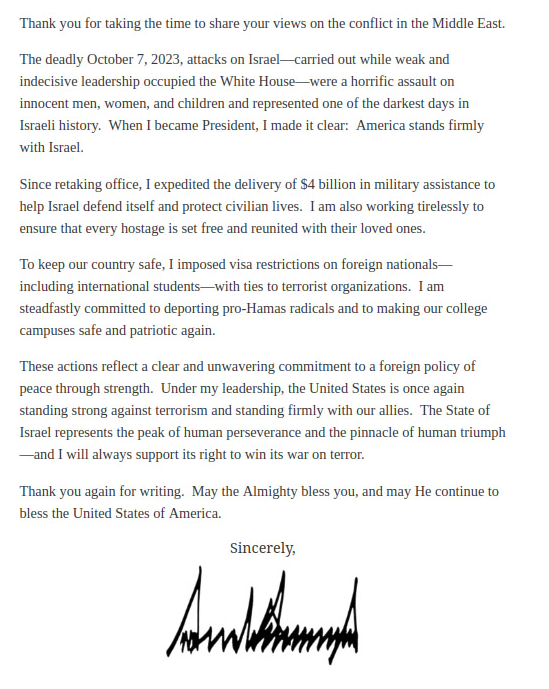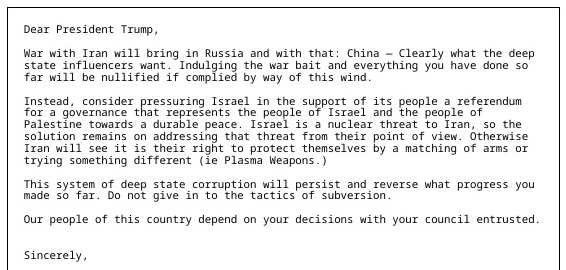Free Speech and Deportation: The Precarious Rights of Non-Citizens in Trump’s America
Posted on 2025-06-12
Categories: Education, Social, War, Power, Handlers

In the United States, the First Amendment stands as a cornerstone of democratic freedom, guaranteeing the right to speak, protest, and dissent. Yet, for non-citizens living within U.S. borders, these protections are far from absolute. The Supreme Court has long held that non-citizens are entitled to free speech rights (Bridges v. Wixon, 1945), but immigration law significantly curtails these freedoms. The government can restrict or penalize speech deemed to threaten national security, public safety, or immigration status, creating a stark divide between citizens and non-citizens. Under the current Trump administration, this divide has widened, particularly for pro-Palestinian activists, as seen in the case of Mahmoud Khalil, a green card holder detained for leading anti-genocide protests labeled as “pro-terrorist” or “anti-Semitic.” This crackdown, driven by the administration’s unwavering support for Israel—rooted in President Trump’s theological vision of ushering in the Third Temple—raises profound questions about free speech, immigration policy, and the erosion of dissent in America.
The Legal Divide: Citizens vs. Non-Citizens:
For U.S. citizens, the First Amendment offers robust protection for political speech, including controversial or offensive expressions. Exceptions are narrow, limited to incitement of imminent lawless action (Brandenburg v. Ohio, 1969), true threats (Watts v. United States, 1969), or material support for designated terrorist organizations (18 U.S.C. § 2339B). Citizens cannot be deported for their speech, and any government action against them faces strict scrutiny in federal courts, ensuring strong due process under the Fifth and Fourteenth Amendments. Even Trump’s recent rhetoric about deporting citizen “Communists” and “Marxists,” as reported in a March 2025 exposé, lacks legal grounding, as denaturalization requires proof of fraud during naturalization, not ideological beliefs.
Non-citizens, however, navigate a precarious landscape. While the Supreme Court has affirmed their free speech rights, immigration law—codified in the Immigration and Nationality Act (INA)—grants the government broad authority to deport non-citizens for speech-related activities. Under INA § 237(a)(4)(B), non-citizens can be removed for actions threatening national security, such as supporting terrorist groups like Hamas. INA § 237(a)(4)(A) allows deportation for activities with “potentially serious adverse foreign policy consequences,” a vague standard applied in Khalil’s case, where his protest leadership was deemed detrimental to U.S. interests. Visa holders face additional risks, as engaging in protests inconsistent with visa terms (e.g., studying) can trigger removal, as seen with Cornell student Momodou Taal in 2025. Unlike citizens, non-citizens face administrative immigration hearings with limited judicial oversight, where courts often defer to executive authority (Kleindienst v. Mandel, 1972).
The Khalil Case: A Flashpoint for Free Speech:
Mahmoud Khalil, a Palestinian green card holder and former Columbia University graduate student, embodies the vulnerability of non-citizens. Arrested on March 8, 2025, by the Department of Homeland Security (DHS), Khalil was targeted for his role in nationwide anti-genocide protests that began at Columbia in 2024. The pro-Israel group Betar U.S. claimed credit for his detention, having included him on a “deport list” shared with the Trump administration. Authorities labeled Khalil’s speech as supporting “pro-terrorist” or “anti-Semitic” activity, though no criminal charges were detailed. His detention in a Louisiana facility sparked protests and lawsuits, with advocates arguing that his First Amendment rights were violated. The case echoes the “LA Eight” saga (1987–2007), where Palestinian activists faced deportation for political speech, only prevailing after two decades.
Khalil’s case is not isolated. Over 300 visa revocations have been reported by March 2025, targeting students and scholars accused of “pro-Hamas” or “anti-American” activism. The administration’s executive order, “Additional Measures to Combat Anti-Semitism,” signed in early 2025, provides the legal framework, promising to remove non-citizens who violate laws, engage in “pro-Hamas vandalism and intimidation,” or promote “anti-Jewish racism” on campuses. Critics, including the American Association of University Professors (AAUP), argue that these vague criteria allow the government to penalize protected speech, creating a chilling effect on dissent.
Trump’s Theological Vision and Israel’s Influence:
At the heart of this crackdown lies the Trump administration’s steadfast support for Israel, which President Trump has tied to his theological stance on summoning the Third Temple. As Trump has stated, his policies reflect a belief in advancing biblical prophecy, aligning U.S. foreign policy with Israel’s interests to facilitate the rebuilding of the Temple in Jerusalem—a goal shared by evangelical and Zionist groups. This ideological commitment manifests in policies that equate criticism of Israel with anti-Semitism or terrorism, disproportionately targeting non-citizens who lack full constitutional protections.
Betar U.S., a self-described “unapologetically Zionist” group with a history of fear mongering rhetoric, has capitalized on this alignment. The group has met with lawmakers like Senator John Fetterman and aides to Senators Ted Cruz and James Lankford, compiling dossiers on thousands of pro-Palestinian activists for deportation. Their actions, including threats against figures like Francesca Albanese and Nerdeen Kiswani, reveal a pattern of intimidation, yet their influence within the administration grows. The Anti-Defamation League labels Betar an extremist group for its Kahanist ties and calls for genocide, yet their role in shaping deportation policy underscores the administration’s priorities.
The Broader Implications:
The targeting of non-citizens for their speech marks a troubling escalation in government-backed suppression, reminiscent of the McCarthyist era. While citizens remain protected, non-citizens face a double standard, where lawful protests can lead to detention and removal. Immigration courts, unlike federal courts, offer limited recourse, and the government’s plenary power over immigration often overrides constitutional challenges. Lawsuits filed on behalf of Khalil and others argue that these deportations violate the First Amendment, but precedents like INS v. Lopez-Mendoza (1984) favor executive discretion.
This policy not only silences dissent but also aligns with a broader agenda to reshape U.S. foreign policy around theological and geopolitical goals. By framing pro-Palestinian activism as a threat, the administration justifies expansive measures that undermine democratic principles. For non-citizens, the message is clear: speak out at your peril. As Trump’s vision for the Third Temple drives his support for Israel, the cost is paid by those whose rights hang in the balance—non-citizens caught in the crosshairs of immigration law and political ideology.
The legal distinctions between free speech protections for citizens and non-citizens are stark, rooted in the interplay of constitutional and immigration law. While citizens enjoy near-absolute rights, non-citizens like Mahmoud Khalil face deportation for speech that would be protected for others. The Trump administration’s policies, fueled by a theological commitment to Israel and enabled by groups like Betar U.S., exploit these vulnerabilities, targeting dissent under national security clauses.
Original message sent to Trump admin from the canned letter response:

The Legal Divide: Citizens vs. Non-Citizens:
For U.S. citizens, the First Amendment offers robust protection for political speech, including controversial or offensive expressions. Exceptions are narrow, limited to incitement of imminent lawless action (Brandenburg v. Ohio, 1969), true threats (Watts v. United States, 1969), or material support for designated terrorist organizations (18 U.S.C. § 2339B). Citizens cannot be deported for their speech, and any government action against them faces strict scrutiny in federal courts, ensuring strong due process under the Fifth and Fourteenth Amendments. Even Trump’s recent rhetoric about deporting citizen “Communists” and “Marxists,” as reported in a March 2025 exposé, lacks legal grounding, as denaturalization requires proof of fraud during naturalization, not ideological beliefs.
Non-citizens, however, navigate a precarious landscape. While the Supreme Court has affirmed their free speech rights, immigration law—codified in the Immigration and Nationality Act (INA)—grants the government broad authority to deport non-citizens for speech-related activities. Under INA § 237(a)(4)(B), non-citizens can be removed for actions threatening national security, such as supporting terrorist groups like Hamas. INA § 237(a)(4)(A) allows deportation for activities with “potentially serious adverse foreign policy consequences,” a vague standard applied in Khalil’s case, where his protest leadership was deemed detrimental to U.S. interests. Visa holders face additional risks, as engaging in protests inconsistent with visa terms (e.g., studying) can trigger removal, as seen with Cornell student Momodou Taal in 2025. Unlike citizens, non-citizens face administrative immigration hearings with limited judicial oversight, where courts often defer to executive authority (Kleindienst v. Mandel, 1972).
The Khalil Case: A Flashpoint for Free Speech:
Mahmoud Khalil, a Palestinian green card holder and former Columbia University graduate student, embodies the vulnerability of non-citizens. Arrested on March 8, 2025, by the Department of Homeland Security (DHS), Khalil was targeted for his role in nationwide anti-genocide protests that began at Columbia in 2024. The pro-Israel group Betar U.S. claimed credit for his detention, having included him on a “deport list” shared with the Trump administration. Authorities labeled Khalil’s speech as supporting “pro-terrorist” or “anti-Semitic” activity, though no criminal charges were detailed. His detention in a Louisiana facility sparked protests and lawsuits, with advocates arguing that his First Amendment rights were violated. The case echoes the “LA Eight” saga (1987–2007), where Palestinian activists faced deportation for political speech, only prevailing after two decades.
Khalil’s case is not isolated. Over 300 visa revocations have been reported by March 2025, targeting students and scholars accused of “pro-Hamas” or “anti-American” activism. The administration’s executive order, “Additional Measures to Combat Anti-Semitism,” signed in early 2025, provides the legal framework, promising to remove non-citizens who violate laws, engage in “pro-Hamas vandalism and intimidation,” or promote “anti-Jewish racism” on campuses. Critics, including the American Association of University Professors (AAUP), argue that these vague criteria allow the government to penalize protected speech, creating a chilling effect on dissent.
Trump’s Theological Vision and Israel’s Influence:
At the heart of this crackdown lies the Trump administration’s steadfast support for Israel, which President Trump has tied to his theological stance on summoning the Third Temple. As Trump has stated, his policies reflect a belief in advancing biblical prophecy, aligning U.S. foreign policy with Israel’s interests to facilitate the rebuilding of the Temple in Jerusalem—a goal shared by evangelical and Zionist groups. This ideological commitment manifests in policies that equate criticism of Israel with anti-Semitism or terrorism, disproportionately targeting non-citizens who lack full constitutional protections.
Betar U.S., a self-described “unapologetically Zionist” group with a history of fear mongering rhetoric, has capitalized on this alignment. The group has met with lawmakers like Senator John Fetterman and aides to Senators Ted Cruz and James Lankford, compiling dossiers on thousands of pro-Palestinian activists for deportation. Their actions, including threats against figures like Francesca Albanese and Nerdeen Kiswani, reveal a pattern of intimidation, yet their influence within the administration grows. The Anti-Defamation League labels Betar an extremist group for its Kahanist ties and calls for genocide, yet their role in shaping deportation policy underscores the administration’s priorities.
The Broader Implications:
The targeting of non-citizens for their speech marks a troubling escalation in government-backed suppression, reminiscent of the McCarthyist era. While citizens remain protected, non-citizens face a double standard, where lawful protests can lead to detention and removal. Immigration courts, unlike federal courts, offer limited recourse, and the government’s plenary power over immigration often overrides constitutional challenges. Lawsuits filed on behalf of Khalil and others argue that these deportations violate the First Amendment, but precedents like INS v. Lopez-Mendoza (1984) favor executive discretion.
This policy not only silences dissent but also aligns with a broader agenda to reshape U.S. foreign policy around theological and geopolitical goals. By framing pro-Palestinian activism as a threat, the administration justifies expansive measures that undermine democratic principles. For non-citizens, the message is clear: speak out at your peril. As Trump’s vision for the Third Temple drives his support for Israel, the cost is paid by those whose rights hang in the balance—non-citizens caught in the crosshairs of immigration law and political ideology.
The legal distinctions between free speech protections for citizens and non-citizens are stark, rooted in the interplay of constitutional and immigration law. While citizens enjoy near-absolute rights, non-citizens like Mahmoud Khalil face deportation for speech that would be protected for others. The Trump administration’s policies, fueled by a theological commitment to Israel and enabled by groups like Betar U.S., exploit these vulnerabilities, targeting dissent under national security clauses.
Original message sent to Trump admin from the canned letter response:

